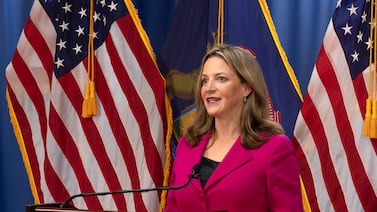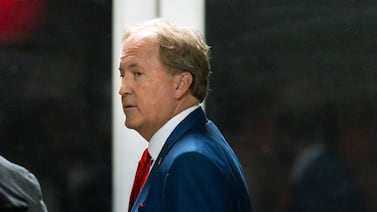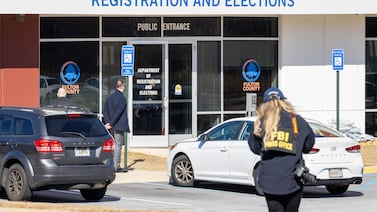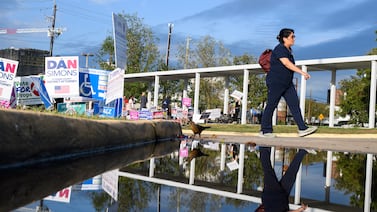Votebeat is a nonprofit news organization reporting on voting access and election administration across the U.S. Sign up for Votebeat Michigan’s free newsletter here.
A new proposal from Michigan’s Senate Democrats could shake up the state’s election calendar and would mean major changes for both campaigns and the election administrators. But it could have trouble balancing the interests of municipal clerks and school districts.
Sen. Sam Singh, the Senate majority floor leader and a Democrat from East Lansing, plans to introduce legislation within two weeks to move Michigan’s August primary to May, with some May races potentially shifting to February.
The changes would take effect in 2027, Singh said, potentially eliminating concerns Republicans in the House expressed about disrupting the 2026 election cycle. Because many campaigns are “up and running,” Singh told Votebeat in an interview last week, making changes in the middle of a cycle “was a significant concern.”
If the proposal becomes law, the general-election period would effectively be stretched out by three months each year. Meanwhile, clerks around the state would see a big shift in their election calendar — but it’s not the one they want. Clerks say they want just two elections a year: one in May or June and one in November.
Getting rid of Michigan’s August primary
Election officials have long urged the state to eliminate the August election and instead combine it with the May contests. Held just three months before the general election, August elections tend to draw low turnout. A recent Department of State report also deemed them “impractical” to audit, as the post-election period creeps up on preparations for November.
The Michigan Association of Municipal Clerks’ official stance is that Michigan doesn’t need three elections each year. Keeping all three, regardless of the timing, is expensive for local governments, said Michael Siegrist, the Canton Township clerk and first vice president of the local clerks association.
“We can satisfy the needs of the voters and other jurisdictions, like school districts, with having a May and November election,” Siegrist told Votebeat. “It ensures decent turnout. It’s more economically advantageous for the state of Michigan. Moving the primary to May or June is ideal, but we believe in merging August and May, as opposed to having the February date.”
Consensus on eliminating August primary fades
Last month, as legislators from both parties struggled through a contentious budget cycle, Democrats in the Senate and Republicans in the House told The Detroit News that they were working on bills that would eliminate the August primary. That brief moment of unity has faded.
Rep. Rachelle Smit, a Republican from Martin Township and former clerk, told The News last month that legislation was in progress to consolidate all elections to May ahead of the 2026 election. However, a Smit spokesperson told Votebeat last week that the House Election Integrity Committee — which Smit chairs — would not consider those bills. Her office declined an interview and did not respond to a request for further comment.
Smit’s pivot follows a new wave of Republican opposition to the plan. Michigan House Speaker Matt Hall told the radio news outlet Michigan Public that he was “very strongly opposed” to changing the primaries ahead of the 2026 election, arguing it would benefit Democrats looking to attack Detroit Mayor Mike Duggan, a Democrat who is running for governor as an independent candidate.
Hall and Smit did not say whether they would support the bills if implementation was moved back to 2027.
Singh told Votebeat his proposal has bipartisan support in the Senate. “My hope is with the fact that we’re looking at future elections, that there will be an opening at some point for the House to consider it,” he said.
School leaders prefer three elections
Similar bills have been introduced in the past with limited success, never advancing to the governor’s desk. In 2021, a cluster of bills made it through the Michigan House to the Senate, then controlled by Republicans, ultimately dying there.
At the time, the legislation was opposed by the Michigan Association of School Boards and other school groups across the state.
School districts have to pay for their own elections under Michigan law, including additional fees if the district joins in on an election with other races, or 100% of the cost if the district’s election is the only one on the ballot.
It can be worth the expense, though, if the election helps the district ensure its funding for future years through approval of millages or bond issues.
Jennifer Smith, director of government relations for MASB, said districts want to be “good stewards” of public money, and part of that is ensuring that they can get the best interest rates on their debt issues. Having three elections offers districts opportunities to time their funding requests for when the best rates are available, and her group has long been in favor of maintaining all three.
“That’s what we’ve been fighting about for years,” she said. “Every time they’ve tried to move the primary, the clerks want to, but they’re not the ones that have to go out for the bond like we do. … More dates to do that would be better.”
Hayley Harding is a reporter for Votebeat based in Michigan. Contact Hayley at hharding@votebeat.org.




